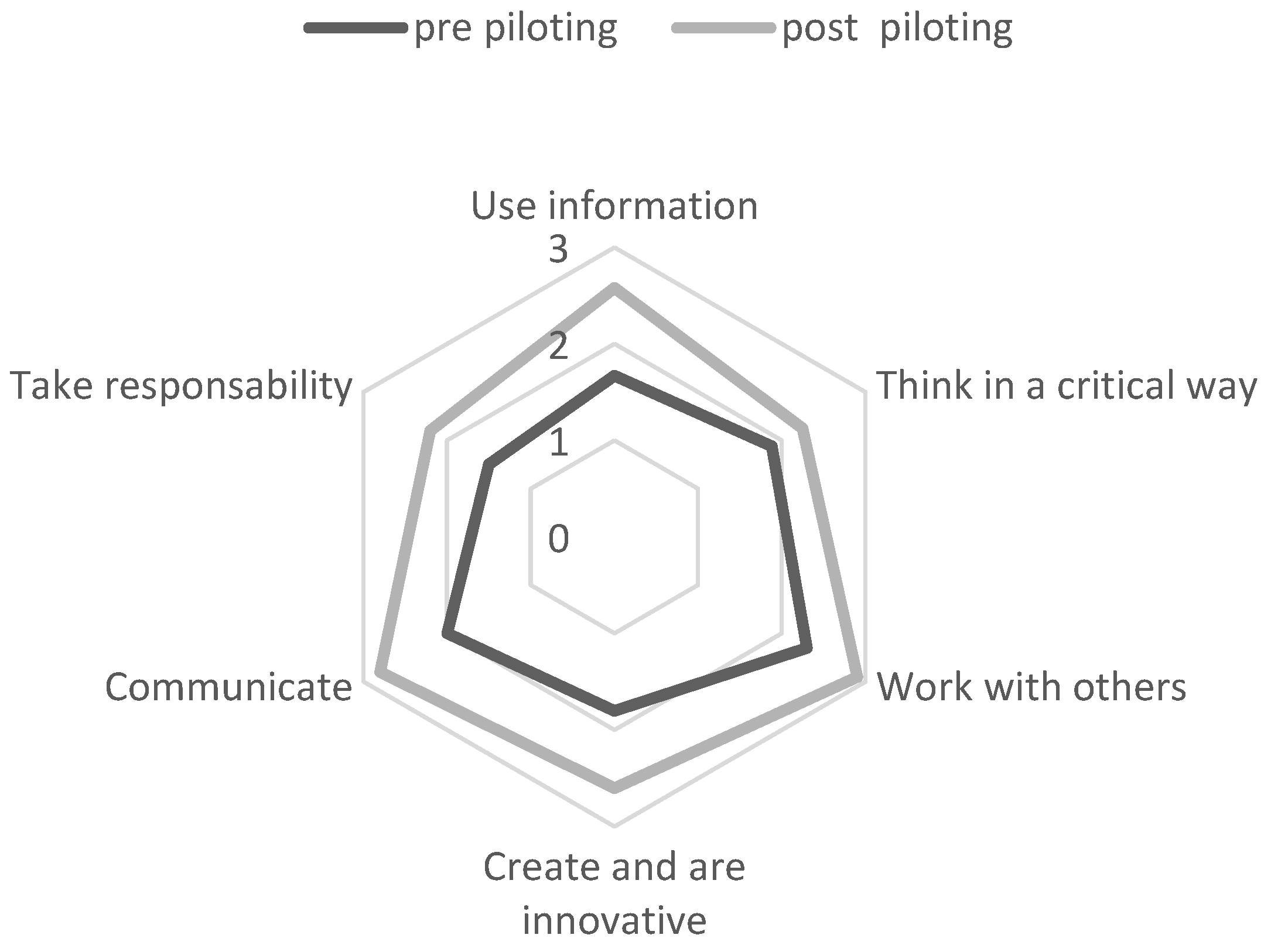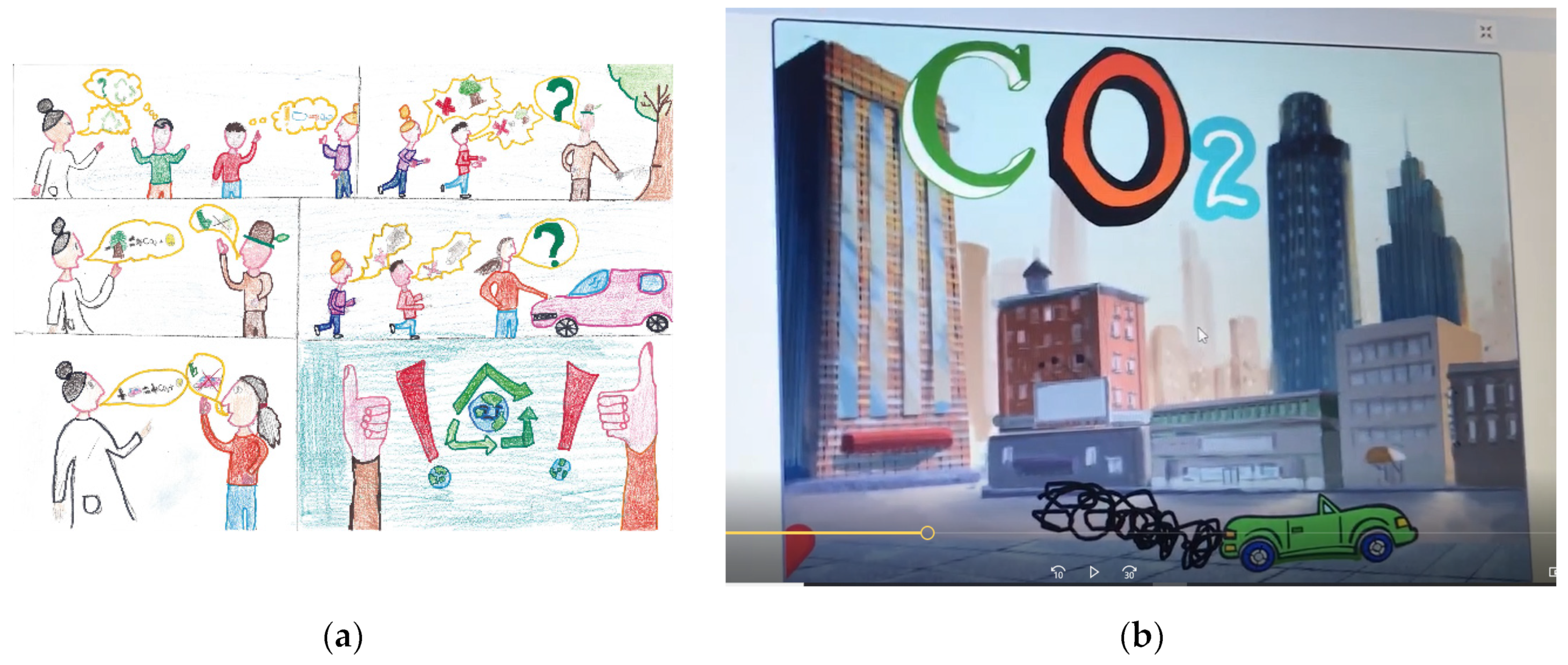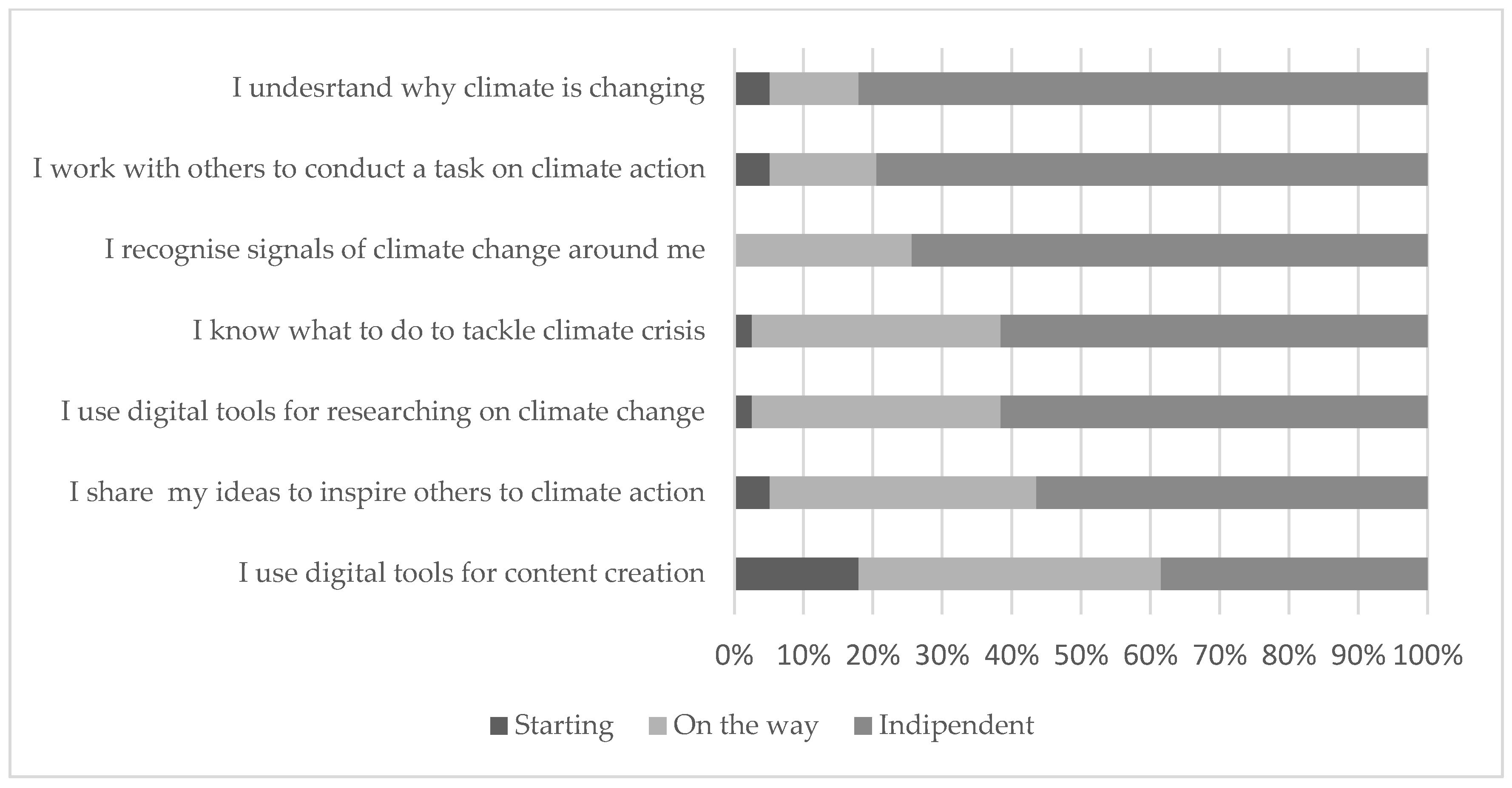Change the Story, Learning to Make a Difference in Climate Crisis †
Abstract
:1. Introduction
2. Research Design and Methodology
3. Findings
- Researching and understanding the basic physical science basis behind climate change;
- Searching for causes, effects and solutions;
- Having real-world experiences and observing their environment and society regarding climate change;
- Reflecting and making connections within the frames of time (past, present, future) and dimension (the self, the community, the global society).
- Expressing their ideas on climate crisis and on what they want to change in order to build a climate-neutral society.
4. Conclusions
Author Contributions
Funding
Institutional Review Board Statement
Informed Consent Statement
Data Availability Statement
Acknowledgments
Conflicts of Interest
References
- Rieckmann, M.; Mindt, L.; Gardiner, S. Education for Sustainable Development Goals; Learning objectives; UNESCO: Paris, France, 2017. [Google Scholar]
- UNESCO. Shaping the education of tomorrow. In Report on the Un Decade of Education for Sustainable Development; UNESCO: Paris, France, 2012. [Google Scholar]
- UNESCO. Roadmap for Implementing the Global Action Programme on Education for Sustainable Development; UNESCO: Paris, France, 2014. [Google Scholar]
- Jensen, B.; Schnack, K. The action competence approach in environmental education. Environ. Educ. Res. 1997, 3, 163–178. [Google Scholar] [CrossRef]
- Change the Story. Creating New Climate Stories across Europe. Available online: www.changethestory.eu (accessed on 16 December 2021).
- Feldman, A.; Altrichter, H.; Posch, P.; Somekh, B. Teachers Investigate Their Work. In An Introduction to the Methods of Action Research Across the Professions; Routledge: London, UK, 2007. [Google Scholar]
- Bybee, R.; Taylor, J.J.A.; Gardner, A.; Van Scotter, P.; Carlson, J.; Westbrook, A.; Landes, N. The BSCS 5E Instructional Model: Origins and Effectiveness; BSCS: Colorado Springs, CO, USA, 2006. [Google Scholar]
- Minner, D.D.; Levy, A.J.; Century, J. Inquiry-based science instruction—What is it and does it matter? Results from a research synthesis years 1984 to 2002. J. Res. Sci. Teach. 2010, 47, 474–496. [Google Scholar] [CrossRef]
- Smith, G.; Sobel, D. Place- and Community-Based Education in Schools; Routledge, Taylor & Francis Group: Abingdon, UK, 2010. [Google Scholar]
- Boy, A.G. From STEM to STEAM: Toward a human-centred education, creativity & learning thinking. In Proceedings of the 31st European Conference on Cognitive Ergonomics (ECCE’13), Toulouse, France, 26–28 August 2013; Association for Computing Machinery: New York, NY, USA; Article 3, pp. 1–7. [Google Scholar] [CrossRef]
- Mishra, P.; Koehler, M.J. Technological Pedagogical Content Knowledge: A Framework for Teacher Knowledge. Teach. Coll. Rec. 2006, 108, 1017–1054. [Google Scholar] [CrossRef]
- Læssøe, J. Education for sustainable development, participation and socio-cultural change. Environ. Educ. Res. 2010, 16, 39–57. [Google Scholar] [CrossRef]
- Mogensen, F.; Schnack, K. The action competence approach and the “new” discourses of education for sustainable development, competence and quality criteria. Environ. Educ. Res. 2010, 16, 59–74. [Google Scholar] [CrossRef]



| Competence | Competence Description | Indicators |
|---|---|---|
| Pupils can find, evaluate and use information about past, present and future climate change | Search, organize and use information for specific purposes | Search information from a variety of digital or non-digital sources |
| Evaluate authenticity, reliability, or validity to interpret or use information | ||
| Use and share information effectively and ethically | ||
| Pupils can think in a critical way to show how change in people’s practices is possible | Ask, enquire, synthesize, evaluate | Questioning and analyzing evidence of climate change |
| Extend understanding of climate change | ||
| Apply scientific approach to analyze, evaluate, and take actions on climate change | ||
| Pupils can work with others to develop their digital story about the climate crisis. | Participate, collaborate data | Share responsibility |
| Value the contributions of others | ||
| Demonstrate sensitivity to other audience or contexts | ||
| Pupils can create contents about and for the planet, living organisms and people, including themselves | Apply ideas in new ways, create something of value, elaborate data | Create new narratives for the future within digital and not-digital contexts |
| Pupils can communicate with others | Share, exchange ideas considering impact, respect for others | Produce and share coherent and cohesive contents on climate change through digital or non-digital, oral, written, or non-verbal means. |
| Take responsibility on how to tackle the climate crisis | Acknowledge and accept the choices made | Demonstrate responsible citizenship through actions that contribute to sustainable communities. |
| Evaluate the impact of decisions or actions on the dignity and well-being of individuals or communities |
| I Can | Starting | On the Way | Indipendent |
|---|---|---|---|
| Inspiring others through a digital story about the climate crisis | I still need to learn about some digital tools that help me to share my story with others. | I have learned about some digital tools. Now I need to find out how they can help me to share my story with others. | I can use digital tools to share and communicate effectively to different audiences. |
| Investigating the past and present | I am still learning about how to investigate and understand changes in the past, and how this influences the present climate. | I am investigating changes in the past, to find out how this influences the present climate. | I can investigate and understand changes in the past in relation to the present climate situation. |
| Sharing of my ideas for making changes | I still need to learn about how I can be part of making change | I am starting to learn about how to be part of making change. | I can be part of making change. |
| Changing things in the present for climate crisis | I still need to learn how people, including myself can make changes in the present. | I’m learning how people including myself can make a change in the present. | I’m aware ofhow people are influencing and can make changes. |
| Working with others | I still need to find out how I can work with others (pupils, teachers, parents, friends or other experts) to create a new story which tackles the climate crisis. | I am starting to find out how I can work with others to create a new story about what we can do about the future climate. | I can work with others to create a new story which tackles the climate crisis. |
Publisher’s Note: MDPI stays neutral with regard to jurisdictional claims in published maps and institutional affiliations. |
© 2022 by the authors. Licensee MDPI, Basel, Switzerland. This article is an open access article distributed under the terms and conditions of the Creative Commons Attribution (CC BY) license (https://creativecommons.org/licenses/by/4.0/).
Share and Cite
Baglivo, L.; Conti, D. Change the Story, Learning to Make a Difference in Climate Crisis. Environ. Sci. Proc. 2022, 14, 4. https://doi.org/10.3390/environsciproc2022014004
Baglivo L, Conti D. Change the Story, Learning to Make a Difference in Climate Crisis. Environmental Sciences Proceedings. 2022; 14(1):4. https://doi.org/10.3390/environsciproc2022014004
Chicago/Turabian StyleBaglivo, Luca, and Daniela Conti. 2022. "Change the Story, Learning to Make a Difference in Climate Crisis" Environmental Sciences Proceedings 14, no. 1: 4. https://doi.org/10.3390/environsciproc2022014004
APA StyleBaglivo, L., & Conti, D. (2022). Change the Story, Learning to Make a Difference in Climate Crisis. Environmental Sciences Proceedings, 14(1), 4. https://doi.org/10.3390/environsciproc2022014004






